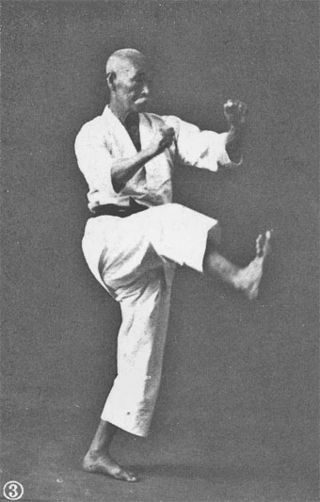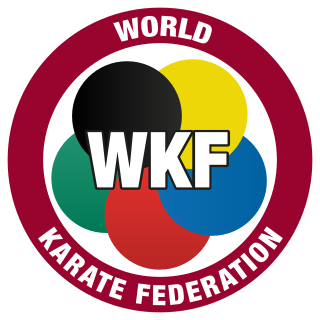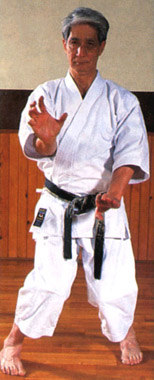
Karate (空手), also karate-do, is a martial art developed in the Ryukyu Kingdom. It developed from the indigenous Ryukyuan martial arts under the influence of Chinese martial arts. While modern karate is primarily a striking art that uses punches and kicks, traditional karate also employs throwing and joint locking techniques. A karate practitioner is called a karate-ka (空手家).

The United States Olympic & Paralympic Committee (USOPC) is the National Olympic Committee (NOC) and the National Paralympic Committee for the United States. It was founded in 1895 and is headquartered in Colorado Springs, Colorado. The USOPC is one of only four NOCs in the world that also serve as the National Paralympic Committee for their country. The USOPC is responsible for supporting, entering and overseeing U.S. teams for the Olympic Games, Paralympic Games, Youth Olympic Games, Pan American Games, and Parapan American Games and serves as the steward of the Olympic and Paralympic Movements in the United States.

The Amateur Athletic Union (AAU) is an amateur sports organization based in the United States. A multi-sport organization, the AAU is dedicated exclusively to the promotion and development of amateur sports and physical fitness programs. It has more than 700,000 members nationwide, including more than 100,000 volunteers. The philosophy of the AAU is "Sports for All, Forever."

Sambo is a martial art with Soviet origins, an internationally practised combat sport, and a recognized style of amateur wrestling included by UWW in the World Wrestling Championships along with Graeco-Roman wrestling and freestyle wrestling.

USA Swimming is the national governing body for competitive swimming in the United States. It is charged with selecting the United States Olympic Swimming team and any other teams that officially represent the United States, as well as the overall organization and operation of the sport within the country, in accordance with the Olympic and Amateur Sports Act. The national headquarters of USA Swimming is located at the U.S. Olympic Training Center in Colorado Springs, Colorado.

The World Karate Federation (WKF) is an international governing body of sport karate with 198 member countries. It is the only karate organization recognised by the International Olympic Committee and has more than a hundred million members. The WKF organizes their Junior and Senior Karate World Championships, which are each held every other year. The President of the WKF is Antonio Espinós, and the headquarters are located in Madrid, Spain.

United States of America Gymnastics is the national governing body for gymnastics in the United States. Established in 1963 as the U.S. Gymnastics Federation (USGF), USA Gymnastics is responsible for selecting and training national teams for the Olympic Games and World Championships. The revised 2018 mission of USA Gymnastics is focused on "creating a culture that empowers and supports its athletes and focuses on its highest priority, the safety and well-being of the athletes." USAG sets the rules and policies that govern the sport of gymnastics, including "promoting and developing gymnastics on the grassroots and national levels, as well as a safe, empowered and positive training environment, and serving as a resource center for members, clubs, fans and gymnasts throughout the United States."
United States Aquatic Sports (USAS) is the national federation for aquatic sports which represents the United States in FINA. Since by U.S. law and FINA regulations, the United States must have only one national federation for itself to FINA, United States Aquatic Sports has served as the unifying body for the sports since 1980. Five separate national governing bodies (NGBs) make up USAS: USA Swimming, USA Diving, United States Synchronized Swimming, USA Water Polo, and U.S. Masters Swimming. Of the five, only U.S. Masters Swimming (USMS) is not a member of the United States Olympic Committee.

USA Shooting (USAS), a 501(c)(3) non-profit organization, was chartered by the United States Olympic & Paralympic Committee as the National Governing Body (NGB) for the sport of shooting in April 1995. USA Shooting's mission is to prepare American athletes to compete at the Olympic Games, promote the shooting sports throughout the U.S., and govern the conduct of international shooting in the country. The organization implements and manages development programs and sanctions events at the local, state, regional, and national levels.

Hidetaka Nishiyama was a prominent Japanese master of Shotokan karate. He was an internationally recognized instructor, author, and administrator, and helped to establish the Japan Karate Association. Nishiyama was one of the last surviving students of Gichin Funakoshi, founder of Shotokan karate. He was based in the United States of America from 1961 until his death in 2008, and was a pioneer of karate in that country. He had been posthumously awarded the rank of 10th dan in karate.

The Japan Karate Federation (JKF), a.k.a. Japan Karatedo Federation, is a national governing body of the sport karate in Japan. The JKF is officially affiliated with the Japan Olympic Association (JOC), World Karate Federation (WKF), Japan Sports Association (JSA), and Japanese Budō Association (JBA). The styles recognized by the JKF are Wadō-ryū, Shotokan, Shito-ryu, and Goju-ryu. Its headquarter is located in Tokyo, Japan.

The Amateur Sports Act of 1978, signed by President Jimmy Carter, established the United States Olympic Committee and provides for national governing bodies for each Olympic sport. The Act provides important legal protection for individual athletes.
Kyongwon Ahn, 9th dan (Kukkiwon), is a South Korean taekwondo master who founded the United Taekwondo Association (UTA) in the United States.

The International Traditional Karate Federation or ITKF is the international governing body for Traditional Karate. This organisation was founded by Hidetaka Nishiyama. In the early 1990s, Nishiyama's refusal to align his ITKF organization with the World Union of Karate-Do Organizations (WUKO) caused the International Olympic Committee to suspend its recognition of WUKO as amateur karate's international governing body. According to the IOC decision 101 from 1993 the ITKF and WUKO had been due to merge and form a unified karate organization under the IOC suggested name of WKF. The IOC further indicated its intention to recognize the merged WKF should ITKF and WUKO successfully fulfill the IOC 101 decision guidelines, but this did not eventuate. The WUKO eventually became the World Union of Karate-Do Federations in late 2008.

USA Wrestling is the organization that currently governs freestyle wrestling and Greco-Roman wrestling in the United States. USA Wrestling is also the official representative to the United States Olympic & Paralympic Committee (USOPC) and to United World Wrestling (UWW) and is considered the national governing body of the sport at the competitive level. Their mission statement is, "USA Wrestling, guided by the Olympic Spirit, provides quality opportunities for its members to achieve their full human and athletic potential."

The European Karate Federation (EKF) is the governing body of competitive karate in more than 50 countries across Europe. The EKF's stated goal is to promote, organize, regulate, and popularize the sport of karate. It is one of the five continental federations recognized by the World Karate Federation.
Dov Sternberg is an American karateka.
Swimming in the United States began competitively in the 1880s. The first nationally recognized swimming organization was the Amateur Athletic Union in 1888.

Karate was first introduced to American service men after World War II by Japanese and Okinawan karate masters.

Karate began in the 14th century on the island of Okinawa. Karate as a word first emerged due to Gichin Funakoshi. Karate was introduced to mainland Japan in the 1920s.
















